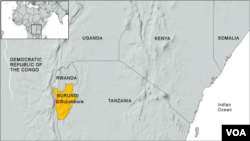Military officials in Burundi this week said soldiers killed nearly 100 alleged rebel combatants during five days of fighting near the border with the Democratic Republic of Congo.
Nine of the fighters blamed for the violence that started northwest of the capital, Bujumbura, were arrested.
Officials have yet to say whether they were rebels from the FNL movement, which operates in the region, or another group altogether, but Deputy Presidential Spokesman Gervais Abayeho says there is suspicion the alleged attack may be part of an attempt to disrupt elections scheduled to begin in May.
“I believe the first incident whereby Burundi suffered an attack from the Democratic Republic of Congo could be politically motivated because the army who were involved in the fighting say the armed group was trying to reach one big forest in the area, where they would stage widespread attacks across the country ahead of this year's elections.”
Political tensions are already high in Burundi due in part to differing views on whether President Pierre Nkurunziza has the constitutional authority to seek a third term in office.
Mysterious attacks like the one blamed on unnamed rebels from the DRC only adds to the feeling of uncertainty in the country, according to civil society groups.
Vital Nshimirimana, the legal representative of the Forum for Strengthening Civil Society in Burundi, has disputed the government's account of the violence.
Speaking to VOA by phone from Bujumbura, he said he is worried by recent comments from government figures and on social media suggesting the opposition supported the attacks.
“This is what leads us to think that it might be a fake explanation to actually take advantage of the same to arrest opposition leaders or some civil society [members],” he said.
Rights groups say there is little room for the opposition to operate in Burundi, pointing out strict media laws and restrictions on the freedom to assembly.
In March last year, security forces arrested members of the Movement for Solidarity and Democracy party at their headquarters. Following a one-day trial, 21 members were sentenced to life in prison on charges of insurrection.
Presidential spokesman Abayeho says the government plans to enhance security to guard against the prospect of more violence before the elections.
“Whenever elections approach, there is what we call electoral fervor which is mounting in this country, so the government is doing all it can to ensure that people are safe,” he said.
The opposition boycotted the last vote in 2010 because of concerns of vote-rigging, giving an easy victory to President Nkurunziza.
The United Nations this month launched an electoral observer mission, known by the French Acronym MENUB, to oversee the upcoming vote.








